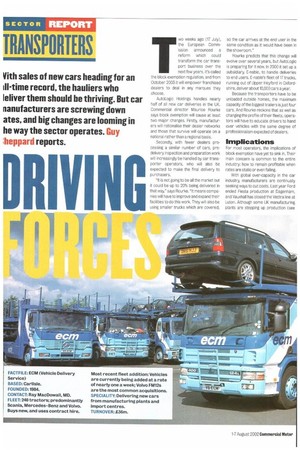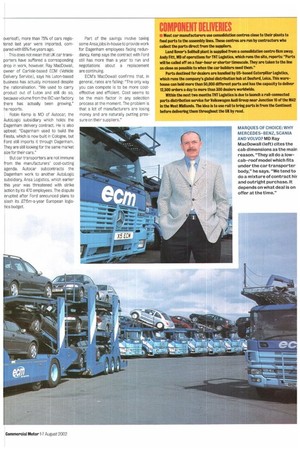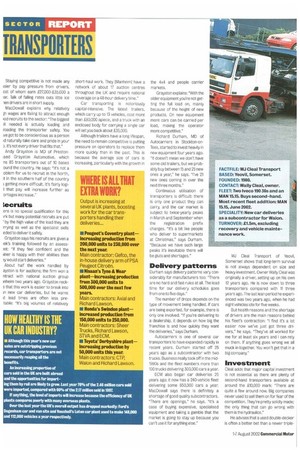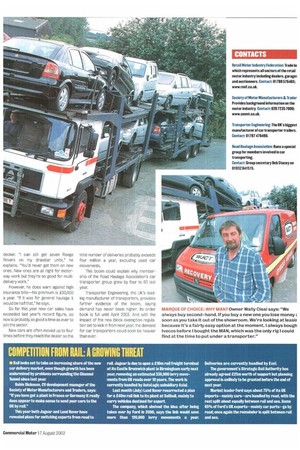Vith sales of new cars heading for an ill-time record,
Page 30

Page 31

Page 32

Page 33

If you've noticed an error in this article please click here to report it so we can fix it.
the hauliers who leliver them should be thriving. But car nanufacturers are screwing down ates, and big changes are looming in he way the sector operates. Guy ;heppard reports. Tvvo weeks ago (17 July), the European Commission announced a reform which could transform the car transport business over the next few years. It's called the block exemption regulation, and from October 2003 it will empower franchised dealers to deal in any marques they choose.
AutoLogic Holdings handles nearly half of all new car deliveries in the UK. Commercial director Maurice Rourke says block exemption will cause at least two major changes. Firstly, manufacturers will rationalise their dealer networks and those that survive will operate on a national rather than a regional basis.
Secondly, with fewer dealers processing a similar number of cars, predelivery inspection and preparation work will increasingly be handled by car transporter operators, who will also be expected to make the final delivery to purchasers.
"It is not going to be all the market but it could be up to 20% being delivered in that way" says Rourke. "It means companies will have to improve and expand their facilities to do this work. They will also be using smaller trucks which are covered, so the car arrives at the end user in the same condition as it would have been in the showroom."
Rourke predicts that this change will evolve over several years, but AutoLogic is preparing for it now. In 2000 it set up a subsidiary E-nable, to handle deliveries to end users. E-nable's fleet of 17 trucks, running out of Upper Heyford in Oxfordshire, deliver about 10,000 cars a year.
Because the transporters have to be unloaded outside homes, the maximum capacity of the biggest trailers isjust four cars. And Rourke reckons that as well as changing the profile of their fleets, operators will have to educate drivers to hand over vehicles with the same degree of professionalism expected of dealers.
Implications
For most operators, the implications of block exemption have yet to sink in. Their main concern is common to the entire industry: how to remain profitable when rates are static or even falling.
With global over-capacity in the car industry manufacturers are continually seeking ways to cut costs. Last year Ford ended Fiesta production at Dagenham, and Vauxhall has closed the Vectra line at Luton, Although some UK manufacturing plants are stepping up production (see overleaf), more than 75% of cars registered last year were imported, cornpared with 65% five years ago.
This does not mean that UK car transporters have suffered a corresponding drop in work, however. Ray MacDowall, owner of Carlisle-based ECM (Vehicle Delivery Service), says his Luton-based business has actually increased despite the rationalisation. We used to carry product out of Luton and still do so, because volume from the IBC van factory there has actually been growing," he reports.
Robin Kemp is MD of Autocar, the AutoLogio subsidiary which holds the Dagenham delivery contract. He is also upbeat: "Dagenham used to build the Fiesta, which is now built in Cologne, but Ford still imports it through Dagenham. They are still looking for the same market size for their cars.'
But car transporters are not immune from the manufacturers' cost-cutting agenda. Autocar subcontracts the Dagenham work to another AutoLogic subsidiary, Ansa Logistics, which earlier this year was threatened with strike action by its 470 employees. The dispute erupted after Ford announced plans to slash its £715m-a-year European logistics budget. Part of the savings involve taking some Ansa jobs in-house to provide work for Dagenham employees facing redundancy. Kemp says the contract with Ford still has more than a year to run and negotiations about a replacement are continuing.
ECM's MacDowali confirms that, in general, rates are falling: "The only way you can compete is to be more costeffective and efficient. Cost seems to be the main factor in any selection process at the moment. The problem is that a lot of manufacturers are losing money and are naturally putting pressure on their suppliers." Staying competitive is not made any isier by pay pressure from drivers, ost of whom earn 227,0004,35,000 a iar, Talk of falling rates cuts little ice len drivers are in short supply.
MacDowell explains why relatively 11 wages are failing to attract enough loci recruits to the sector: "The biggest ill needed is actually loading and loading the transporter safely. You me got to be conscientious as a person id naturally take care and pride in your D. It's not every driver that fits that." Andy Grayston is MD of Prestonised Grayston Automotive, which ns 85 transporters out of 10 bases ound the country. He says: "It's not a oblem for us to recruit in the North, 1 in the southern half of the country ; getting more difficult. It's fairly logiI that pay will increase further as ortages increase."
teerults
ere is no special qualification for this wk but many potential recruits are put by the high value of the load they are rrying as well as the specialist skills eded to deliver it safely.
Grayston says his recruits are given a iek's training followed by an assessal: "If they feel confident and the iiner is happy with their abilities then )si would start deliveries."
About half the work handled by ayston is for auctions; the firm won a ntract with national auction group inheim two years ago. Grayston recks that this work is easier to break into in new car deliveries, but he warns it lead times are often less pretable: "It's big volumes of relatively short-haul work. They [Manheim] have a network of about 17 auction centres throughout the UK and require national coverage on a 48-hour delivery time."
Car transporting is notoriously capital-intensive. The latest trailers, which carry up to 13 vehicles, cost more than £80,000 apiece, and a truck with an enclosed body for carrying a single car will set you back about 2,35,000.
Although trailers have a long kfespan, the need to remain competitive is putting pressure on operators to replace them more quickly than in the past. This is because the average size of cars is increasing, particularly with the growth in the 4x4 and people carrier markets.
Grayston explains: "With the older equipment you're not getting the full load on, mainly because of the height of new products. On new equipment more cars can be carried per load, making the operator more competitive."
Richard Durham, MD of Autocarriers in Stockton-onTees, started to invest heavily in new equipment four years ago. "It doesn't mean we don't have some old trailers, but we probably buy between 15 and 25 new ones a year," he says. "I've 21 new ones coming in over the next three months."
Continuous utilisation of transporters is difficult: there is only one product they can carry, and the car market is subject to twice-yearly peaks in March and September when the registration prefix changes. "It's a bit like people who deliver to supermarkets at Christmas," says Durham. "Because we have such large peaks it's inevitable there will be gluts and shortages."
Delivery patterns
Durham says delivery patterns vary considerably for manufacturers too: "There are no hard and fast rules at all. The lead time for our delivery schedules goes from one to five days."
The number of drops depends on the type of movement being handled. If cars are being exported, for example, there is only one involved. "If you're delivering to a dealership, it depends on how big the franchise is and how quickly they want the deliveries," says Durham.
Autocarriers is one of several car transporters to have expanded rapidly in recent years. Durham started off 25 years ago as a subcontractor with two trucks. Business really took off in the mid1990s and the fleet numbers more than 100 trucks delivering 300,000 cars a year.
ECM also began car deliveries 25 years ago; it now has a 240-vehicle fleet delivering some 650,000 cars a year. MacDowall says there is definitely a shortage of good quality subcontractors. "There are openings," he says. "It's a case of buying expensive, specialised equipment and taking a gamble that the market is going to stay up because you can't use it for anything else." WJ Deal Transport of Yeovil, Somerset shows that long-term survival is not always dependent on size and heavy investment. Owner Wally deal was originally a driver, setting up on his own 12 years ago. He is now down to three transporters compared with 11 three years ago. The last lean period he experienced was two years ago, when he had eight vehicles idle for five weeks.
But health reasons and the shortage of drivers are the main reasons behind his fleet's contraction: "I find it's a lot easier now we've just got three drivers," he says. 'They've all worked for me for at least six years and I can rely on them. If anything goes wrong we all muck in together. You won't get that in a big company."
Investment
Cleal adds that major capital investment is riot essential as there are plenty of second-hand transporters available at around the £10,000 mark: "There are quite a few around now. Big companies never used to sell them on for fear of the competition. They're pretty solidly made; the only thing that can go wrong with them is the hydraulics."
He advises that a used double-decker is often a better bet than a newer triple decker. "I can still get seven Range Hovers on my drawbar units," he explains. "You'd never get them on new ones. New ones are all right for motorway work but they're no good for multidelivery work."
However, he does warn against high insurance bills—his premium is .230,000 a year. If it was for general haulage It would be half that," he says.
So far this year new car sales have exceeded last year's record figure, so now is probably as good a time as ever to join the sector.
New cars are often moved up to four times before they reach the dealer so the total number of deliveries probably exceeds four million a year, excluding used car movements,
This boom could explain why membership of of the Road Haulage Association's car transporter group grew by four to 60 last year.
Transporter Engineering, the UK's leading manufacturer of transporters, provides further evidence of the boom, saying demand has never been higher. Its order book is full until April 2003. And with the impact of the new block exemption regulation set to kick in from next year, the demand for car transporters could soon be heavier than ever.




























































































































































